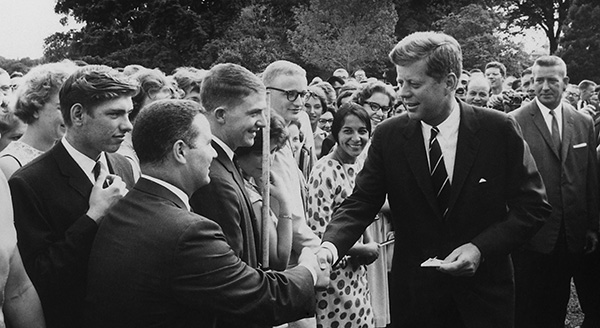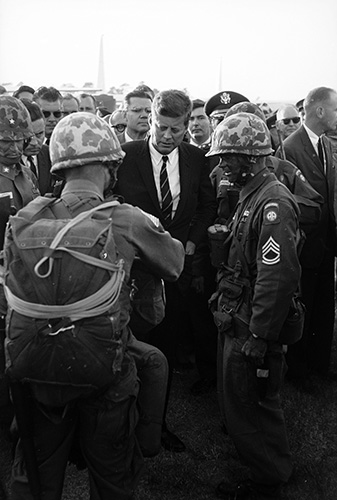
Inauguration Day 1961 was one of the coldest on record. Eight inches of snow had fallen on Washington the night before, and the U.S. Army Corps of Engineers used flamethrowers to clear the streets for the day’s festivities. But the winter sun shone brightly as John F. Kennedy took the oath of office to become the nation’s 35th president, and his inaugural speech was carefully crafted to inspire Americans to meet the challenges of the Cold War world. It was a call to service (“ask not what your country can do for you—ask what you can do for your country”); a commitment to sacrifice (“we shall pay any price, bear any burden”); and an acknowledgment of a changing of the guard (“the torch has been passed to a new generation”). But the truest words in JFK’s first presidential address may have been these: “In your hands, my fellow citizens, more than mine, will rest the final success or failure of our course.”
One of Kennedy’s first initiatives would become the signal achievement of his administration: the Peace Corps. Kennedy’s challenge to help people in emerging nations establish a “decent way of life which is the foundation of freedom and a condition of peace” struck a chord with an idealistic generation of Americans born into prosperity and eager to do good in the world. The Peace Corps was about more than expanding Americans’ horizons: In the Cold War struggle between East and West to nurture allegiances around the globe, the Peace Corps reflected well on the United States. To boost America’s image closer to home, Kennedy proposed the Alliance for Progress—$21 billion in loans to Latin America for schools, hospitals and other projects. Meanwhile, on the domestic front, the president took a cautious approach to civil rights, establishing the Committee on Equal Employment Opportunity to address racial discrimination in hiring. Kennedy ordered federal marshals to protect the integrated Freedom Rides to the South in the spring of 1961, but he stopped short of endorsing the rides themselves. In response to criticism that too few women were appointed to serve in his administration, Kennedy asked Eleanor Roosevelt to chair the Commission on the Status of Women.
 A veteran of World War II with a front-row seat to the developing Cold War, Kennedy expected to play his greatest role on the world stage. “Foreign affairs are the only important issue for a President to handle,” he told Richard Nixon in 1961. Kennedy’s first test came in April. He reluctantly approved a plan put in place by his predecessor, Dwight Eisenhower, to invade Cuba and overthrow Fidel Castro with a force of Cuban exiles trained by the CIA. The invasion at the Bay of Pigs failed miserably, made the United States look incompetent and left Kennedy wondering aloud, “How could I have been so stupid?” But there was little time for self-recrimination. In May the president turned his attention to South Vietnam, where communist rebels threatened the U.S.-backed government in Saigon. Millions of dollars and hundreds of military advisers had already been committed to Vietnam, and Kennedy saw little choice but to continue that support. He authorized 400 more advisers from the U.S. Army’s Special Forces, highly trained in unconventional warfare and known as Green Berets for their unconventional headgear. But another high-stakes test was still ahead. Early in June, Kennedy met with Soviet Premier Nikita Khrushchev in Vienna, Austria. Kennedy hoped to gain credibility after the Bay of Pigs fiasco by forging an agreement with the Soviets on nuclear weapons and turning down the heat on the long-simmering problem of Berlin. After World War II, the former German capital was divided into Western- and Soviet-controlled sectors, even though the city was now within communist East Germany. Khrushchev wanted the West out. Kennedy refused, Khrushchev remonstrated, and the summit ended with not-so-veiled threats of war from both sides.
A veteran of World War II with a front-row seat to the developing Cold War, Kennedy expected to play his greatest role on the world stage. “Foreign affairs are the only important issue for a President to handle,” he told Richard Nixon in 1961. Kennedy’s first test came in April. He reluctantly approved a plan put in place by his predecessor, Dwight Eisenhower, to invade Cuba and overthrow Fidel Castro with a force of Cuban exiles trained by the CIA. The invasion at the Bay of Pigs failed miserably, made the United States look incompetent and left Kennedy wondering aloud, “How could I have been so stupid?” But there was little time for self-recrimination. In May the president turned his attention to South Vietnam, where communist rebels threatened the U.S.-backed government in Saigon. Millions of dollars and hundreds of military advisers had already been committed to Vietnam, and Kennedy saw little choice but to continue that support. He authorized 400 more advisers from the U.S. Army’s Special Forces, highly trained in unconventional warfare and known as Green Berets for their unconventional headgear. But another high-stakes test was still ahead. Early in June, Kennedy met with Soviet Premier Nikita Khrushchev in Vienna, Austria. Kennedy hoped to gain credibility after the Bay of Pigs fiasco by forging an agreement with the Soviets on nuclear weapons and turning down the heat on the long-simmering problem of Berlin. After World War II, the former German capital was divided into Western- and Soviet-controlled sectors, even though the city was now within communist East Germany. Khrushchev wanted the West out. Kennedy refused, Khrushchev remonstrated, and the summit ended with not-so-veiled threats of war from both sides.
Space beckoned the adventuresome in 1962, and Kennedy held firm to his belief that an American would walk on the moon by the end of the 1960s. But the president faced pressing problems here on Earth. Ever more fearful of the Soviet Union’s nuclear capabilities, the United States resumed nuclear testing and increased its arsenal of intercontinental ballistic missiles from 60 in 1961 to 213 in 1962. Try as he might to keep civil rights on the back burner, Kennedy was forced to confront the issue in September when violence erupted in Oxford, Miss., after African-American student James Meredith attempted to enroll at the all-white University of Mississippi. Kennedy dispatched federal troops, Meredith was admitted, and Kennedy promised to send a civil rights bill to Congress. The discovery of Soviet missile sites in Cuba, however, soon overshadowed everything else. The world held its breath, fearing the very real possibility of nuclear war. In the end, the Soviets agreed to remove the missiles in return for an American pledge not to invade Cuba.
.jpg) With a reelection campaign on the horizon, Kennedy focused squarely on domestic issues in 1963: cutting tax rates to stimulate a sluggish economy; initiatives on behalf of the mentally ill and developmentally disabled; a Medicare bill for the elderly; equal pay for women. International issues still called: The president commended the “fighting spirit” of West Berlin during a visit to the Berlin Wall, which Khrushchev had erected to keep East Germans from fleeing to the West. But tensions with the Soviets eased enough for the nuclear superpowers to sign a limited test ban treaty. Kennedy came to realize he could not promote peace and freedom abroad until peace and freedom reigned at home. That summer, after horrific attacks on civil rights activists in Alabama and Mississippi and an integration showdown at the University of Alabama, Kennedy finally introduced sweeping legislation to end racial discrimination in housing, employment, education and access to public facilities, proclaiming, “This is one country.” Kennedy was getting his house in order for what promised to be a grueling 1964 campaign, and that included a trip to Dallas to shore up his political support in Texas. An assassin’s bullet found him there. John F. Kennedy’s 1,036 days in office challenged Americans to face new responsibilities and right old wrongs. Like any presidency, Kennedy’s was filled with good intentions and faulty calculations. But, as Kennedy himself said on that January day in 1961, our success or failure ultimately rests not with him but with all of us. AH
With a reelection campaign on the horizon, Kennedy focused squarely on domestic issues in 1963: cutting tax rates to stimulate a sluggish economy; initiatives on behalf of the mentally ill and developmentally disabled; a Medicare bill for the elderly; equal pay for women. International issues still called: The president commended the “fighting spirit” of West Berlin during a visit to the Berlin Wall, which Khrushchev had erected to keep East Germans from fleeing to the West. But tensions with the Soviets eased enough for the nuclear superpowers to sign a limited test ban treaty. Kennedy came to realize he could not promote peace and freedom abroad until peace and freedom reigned at home. That summer, after horrific attacks on civil rights activists in Alabama and Mississippi and an integration showdown at the University of Alabama, Kennedy finally introduced sweeping legislation to end racial discrimination in housing, employment, education and access to public facilities, proclaiming, “This is one country.” Kennedy was getting his house in order for what promised to be a grueling 1964 campaign, and that included a trip to Dallas to shore up his political support in Texas. An assassin’s bullet found him there. John F. Kennedy’s 1,036 days in office challenged Americans to face new responsibilities and right old wrongs. Like any presidency, Kennedy’s was filled with good intentions and faulty calculations. But, as Kennedy himself said on that January day in 1961, our success or failure ultimately rests not with him but with all of us. AH




